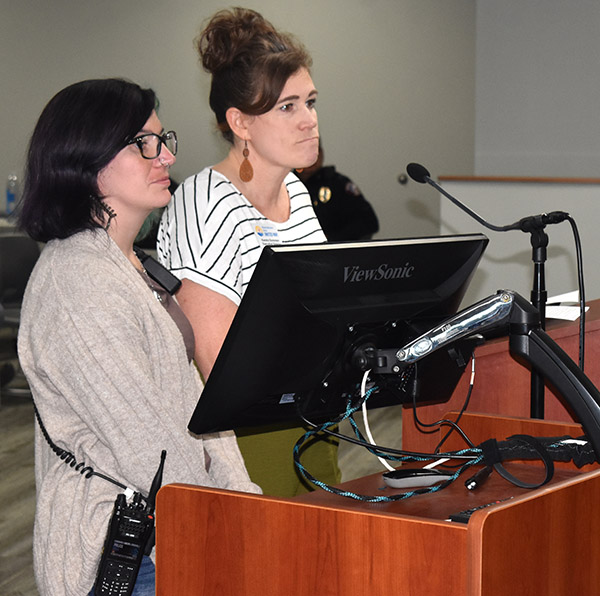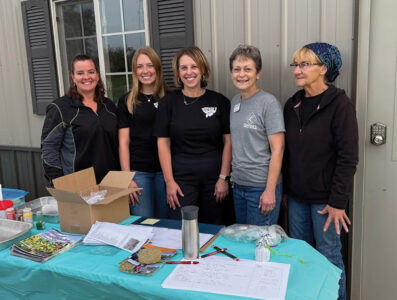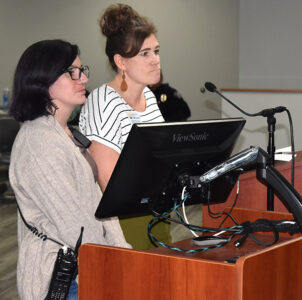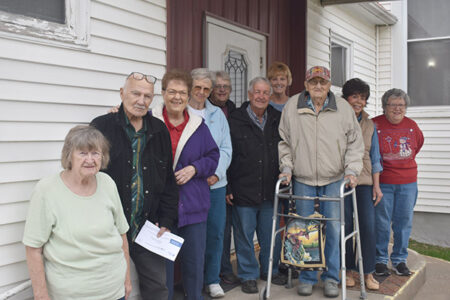Council hears update on homelessness task force

T-R PHOTO BY ROBERT MAHARRY Marshalltown Police and Community Team (MPACT) Advocate Suzy Read and Marshalltown Area United Way Executive Director Kendra Sorensen — two of the four co-chairs of the local Homelessness Task Force — address the city council during Monday night’s meeting.
During Monday night’s regular meeting, the Marshalltown city council received an update from Marshalltown Area United Way (MAUW) Executive Director Kendra Sorensen and Marshalltown Police and Community Team (MPACT) Advocate Suzy Reed, two co-chairs of the Homelessness Task Force, about 2 ½ years after the group launched.
Sorensen noted that there are four total co-chairs of the task force — Jasmin Banderas of CAPS and fellow MPACT advocate Tiffany Beadle are the other two — and the group is comprised of more than 30 active community members committed to addressing housing instability in Marshalltown. From January through mid-October, the task force has handled 50 intakes for homeless prevention or intervention, and 32 individuals and families have received rent assistance or temporary hotel stays.
“Importantly, our focus has been on prevention, helping people remain housed before they lose housing, a proactive rather than reactive approach,” Sorensen said. “It’s through the generosity of our community, including faith-based organizations, 100 Women Who Care, local businesses and individual donors (that) we have received a total of $32,718 in contributions and have distributed $19,589 in direct assistance to those in need.”
Nonprofit organizations like MPACT, CAPS, YSS, Salvation Army, Mid-Iowa Community Action (MICA), the Mid-Iowa Triumph Recovery Center and ACCESS have partnered with the task force to provide case management services, and Sorensen also provided age and demographic breakdowns of those served — about 70 percent women and 38 percent between the ages of 28 and 35 years old, 28 percent ages 36 to 45, 16 percent ages 56 to 65, 10 percent ages 16 to 25 and eight percent ages 46 to 55.
Additionally, 66 percent of those served are white, 14 percent are black, 12 percent Hispanic, four percent multicultural and two percent Native American, Alaskan and Hawaiian/Pacific Islander. Sorensen said the reasons people experience homelessness are complex and range from job loss to unexpected medical bills and car repairs, loss of disability or Social Security benefits and fleeing domestic abuse situations.
Among those who are unhoused, six have reported living outdoors, three in their cars and five staying with friends or family temporarily. The freeze in Housing and Urban Development (HUD) funds has created additional challenges, and Sorensen said the task force has stepped in as a supplemental support system to help bridge gaps.
“The Homelessness Task Force is entirely volunteer led, and we continue to work collaboratively to connect individuals with the resources and case management they need to overcome their barriers,” she said. “As we approach the winter months, our priority is identifying a location that can serve as a warming center. We have a few options and are actively working towards securing a solution. I want to thank you guys again for your time and your continued support for our efforts to ensure everyone in Marshalltown has access to safe and stable housing, and we’ll take any questions that you may have.”
Councilor Mike Ladehoff then asked Sorensen what might disqualify an individual from receiving funding, and she replied that they have to want the assistance and show willingness to be case managed to overcome whatever barriers they are facing.
“Unfortunately, the truth of the matter is some people do want that help and truly walk through the process of how did they get to the situation that they’re in and want to resolve that. And others do not. And we do see that from time to time, but they do have to want the assistance,” Sorensen said. “They have to adhere to meetings and guidelines… It’s a hand up, not a handout.”
Ladehoff added that they have to devise a plan for working and coming up with rent money, and some people simply aren’t willing to commit to that. Sorensen noted that some of those served are literally living paycheck to paycheck, so an unexpected expense can “spin them around” and throw their lives into turmoil.
Councilor Gary Thompson wondered what circumstances were leading up to the need for rent assistance, and Sorensen said most of the individuals were coming to the task force proactively — with many having already received an eviction notice.
“We do our best to try to avoid them being evicted, and then that goes on their record. And then later on, landlords may not want to rent to them or they’ve got to pay an extra deposit, so it just creates additional barriers,” she said. “And that’s the thing that I guess I’m most proud of is that we continue to work proactively versus reactively. So if we can intercede before they become homeless — and that’s helping provide some rent assistance maybe just to get them over a hump, right? They lost a job, they’re waiting on SSI or disability benefits — it provides that little supplemental benefits.”
Thompson followed up by asking where the proactive referrals are coming from and how people know they can turn to the task force, and Sorensen said some are referred through faith-based organizations. Others start with phone calls to the United Way, which then leads to connections to the nonprofit agencies she had previously listed depending on the situation and the individual’s needs.
In response to another question from Thompson about whether the task force was reaching everyone possible, Sorensen said there would always be an “unknown quantity” of people still out there, but they are working with those who desire assistance. She cited one example of a child living in a tent and a school counselor and the child’s mother growing fearful of the winter months to come, and the task force and Mayor Joel Greer worked to connect them with the right resources.
They are now being case managed and have temporary housing secured.
“We’re doing the best we can trying to serve those we can,” Sorensen said. “Honestly, the huge kudos go out to the teams at the local agencies that are providing that case management and walking alongside these individuals. That’s the most important part.”
Greer expressed his appreciation for the work of the task force, noting growing crackdowns on sleeping in tents in other cities like Des Moines and the pending suspension of Supplemental Nutrition Assistance Program (SNAP) benefits due to the ongoing government shutdown.
——
Contact Robert Maharry at 641-753-6611 ext. 255 or rmaharry@timesrepublican.com.






